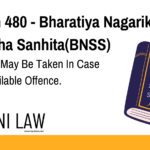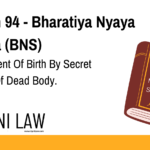Code: Section 84 – Bharatiya Sakshya Adhiniyam, 2023
The Court shall presume that every document purporting to be a
power-of-attorney, and to have been executed before, and authenticated by, a Notary Public,
or any Court, Judge, Magistrate, Indian Consul or Vice-Consul, or representative of the
Central Government, was so executed and authenticated.
Explanation of Section 84 BSA
Section 84 of the Bharatiya Sakshya Adhiniyam (BSA) creates a presumption in favor of the genuineness and authenticity of certain power-of-attorney documents. Specifically, it provides that the court shall presume a power-of-attorney document is validly executed and authenticated if:
-
It appears to be a power-of-attorney on its face,
-
It shows execution before, and authentication by, any of the following:
-
A Notary Public,
-
A Judge or Magistrate,
-
Any Court,
-
An Indian Consul or Vice-Consul, or
-
A representative of the Central Government.
-
This presumption simplifies legal proceedings by eliminating the need for formal proof of execution and authentication of such documents, unless contested.
Illustration
Example 1: Power-of-Attorney Notarized in India
A power-of-attorney is presented in court which bears the seal and signature of a registered Notary Public. Under Section 84, the court shall presume it was validly executed and authenticated.
Example 2: Power-of-Attorney Executed Abroad
A power-of-attorney executed in the United States is authenticated before an Indian Consul in New York. The Indian court will presume its genuineness under Section 84 without requiring further proof.
Common Questions and Answers on Section 84 BSA
1. What is the legal benefit of Section 84?
It allows courts to accept certain power-of-attorney documents without needing formal evidence of their execution and authentication, thereby reducing procedural delays.
2. Who can authenticate a power-of-attorney under this section?
The following authorities are covered:
-
Notary Public
-
Any Court, Judge, or Magistrate
-
Indian Consul or Vice-Consul
-
Representative of the Central Government
3. Can the presumption be challenged?
Yes. If there is credible evidence to suggest that the document was not genuinely executed or authenticated, the opposing party can rebut the presumption.
4. Is this section applicable to documents executed outside India?
Yes. As long as the document is authenticated by a recognized authority such as an Indian Consul or Vice-Consul, the presumption applies even to documents executed abroad.
5. Does the court automatically accept all power-of-attorney documents?
No. The document must meet the criteria stated in Section 84. If it appears to be executed and authenticated by an authorized person, the presumption applies—subject to rebuttal.
Conclusion
Section 84 of the Bharatiya Sakshya Adhiniyam facilitates the easy acceptance of power-of-attorney documents that are executed and authenticated by recognized authorities. By removing the requirement of formal proof, it ensures smoother legal transactions—especially in property matters, banking, and foreign delegations of authority.
For more clear, structured legal explanations, visit ApniLaw.












